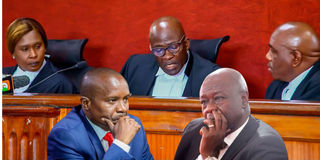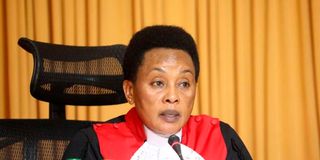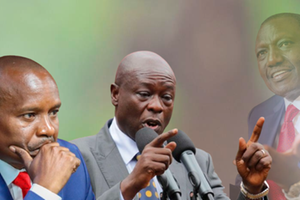
From left to right background: Justices Freda Mugambi, Eric Ogola and Anthony Mrima during the hearing of a petition challenging the impeachment of Deputy President Rigathi Gachagua (foreground right) at the High Court on October 29, 2024. Also in the picture is DP-designate Kithure Kindiki.
Following Friday’s Court of Appeal judgment declaring that the High Court bench which allowed Prof Kithure Kindiki to be sworn in as Deputy President was illegally constituted, Sunday Nation has gone back to the court files to examine the timeline of events surrounding the development.
This comes as the country awaits the Chief Justice to properly reconstitute a bench to determine the implications of the ruling - specifically, whether former Deputy President Rigathi Gachagua was lawfully replaced by Prof Kindiki. The order barring the changes was lifted by judges selected by Deputy Chief Justice Philomena Mwilu - a role the appellate court now says is exclusively reserved for the Chief Justice.
The situation is being closely monitored, as the Constitution does not envisage a scenario in which a sitting Deputy President is removed from office through a court order.
The three-judge bench and parties are expected to address whether the actions taken by the unconstitutionally empanelled bench remain valid. A ruling nullifying those actions could plunge the country into a constitutional crisis.

Deputy Chief Justice Philomena Mwilu.
On October 18, 2024, as the nation focused on Mr Gachagua’s impeachment process, two residents of Kirinyaga - Mr David Munyi Mathenge, an MCA for Baragwi Ward, and Mr Peter Gichobi Kamotho - moved to court and obtained orders from Justice Richard Mwongo temporarily stopping implementation of the Senate resolution that removed Mr Gachagua from office.
According to court records, the order was extracted at 15:37:50 by Deputy Registrar Claire Wanyama.
Given the gravity of the matter, Justice Mwongo directed that the case file be forwarded to Chief Justice Martha Koome for assignment to an expanded bench.
That night, however, a notice issued by DCJ Mwilu indicated that she had appointed a three-judge bench comprising Justices Erick Ogolla, Anthony Murima, and Frida Mugambi. The notice required parties to appear before the bench the following day - Saturday.

Presiding Judge Erick Ogolla (centre) confers with Justices Freda Mugambi and Anthony Mrima at the Milimani Law Courts in Nairobi on Wednesday, October 23, 2024.
The same three judges had earlier, on October 14, been appointed by CJ Koome to hear six consolidated petitions in Nairobi challenging the constitutionality of the impeachment process. This empanelment followed Justice Lawrence Mugambi’s finding that the petitions raised substantial legal issues.
After the Senate approved Mr Gachagua’s removal, the Speaker formally communicated the decision through a Gazette Notice dated October 17. In response, President William Ruto nominated Interior Cabinet Secretary Prof Kindiki to fill the Deputy President’s position.
The National Assembly convened on the morning of October 18 to consider Prof Kindiki’s nomination and later that day issued a Gazette Notice confirming it had approved him for the role.
Two significant court decisions were issued that day. First, in Nairobi, Justice Chacha Mwita granted Mr Gachagua an order suspending the Senate’s resolution and blocking the appointment of his replacement. The order was valid until October 24, when the matter was to return to court.
Second, in Kerugoya, Justice Mwongo issued an order barring Prof Kindiki’s swearing-in and placed the file before the CJ for the formation of a bench.
Despite these developments, on Saturday, October 19, a bench convened under DCJ Mwilu’s instructions and scheduled the hearing of the Kerugoya case for October 22.
When the matter was heard on October 22, the bench, led by Justice Ogolla, confirmed that they had been appointed by DCJ Mwilu on the night of October 18. Petitioners objected, arguing that only the Chief Justice has the constitutional authority to empanel such a bench under Article 165(4).
On October 31, the expanded bench reconvened to handle both the Nairobi petitions assigned by CJ Koome and the Kerugoya case assigned by DCJ Mwilu.
Upon an application by the Attorney General, the bench lifted the conservatory orders previously issued by the High Court in Kerugoya. The earlier order from Justice Mwita had already lapsed without extension, leaving only the Kerugoya order in effect.
This paved the way for Prof Kindiki’s swearing-in on November 1, 2024, officially succeeding Mr Gachagua.

Deputy President Prof Kithure Kindiki takes his oath of office during his swearing-in at Kenyatta International Convention Centre in Nairobi on November 1, 2024.
However, the Kerugoya petitioners protested that the bench should never have handled their case, arguing that DCJ Mwilu lacked the legal mandate to appoint it. They further claimed that the empanelment, done at night, was unconstitutional and excluded earlier petitions that had not been assigned to any bench. They accused DCJ Mwilu of bias in favour of the government, undermining judicial impartiality and violating constitutional principles of fairness.
On Friday, the Court of Appeal agreed, ruling that no justification had been provided for why the DCJ assumed the CJ’s role, nor why the Chief Justice was unavailable to act.
“In this day and age, we do not think that the Chief Justice can be ‘electronically absent’ for an inordinately long period of time, such that she cannot empanel a bench or give appropriate directions. That can be done electronically from nearly any part of the world. In this case, there was no suggestion that the Chief Justice was electronically unreachable, or physically unable to perform her constitutional administrative function,” Justices Daniel Musinga, Mumbi Ngugi, and Francis Tuiyott ruled.
Given the confusion over the Saturday sitting, the court urged the Chief Justice to issue practice directions clarifying how parties may access urgent court interventions on weekends and public holidays.
“This is necessary given that the Judicature Act still provides that the official working hours of the Judiciary are Monday to Friday. Since matters are now filed electronically any day and hour of the whole week, we do not think there is anything wrong with a judge or a bench issuing directions on a Saturday, Sunday, or public holiday, as long as the directions are not prejudicial to any party,” the judges ruled.








